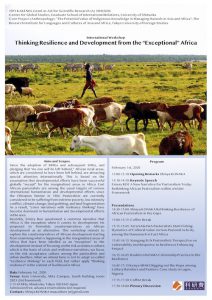JSPS KAKENHI, Grant-in-Aid for Scientific Research (A) 18H03606; Center for Global Studies, Graduate School of International Relations, University of Shizuoka; Core Project (Anthropology): “The Potential Value of Indigenous Knowledge in Managing Hazards in Asia and Africa”, The Research Institute for Languages and Cultures of Asia and Africa, Tokyo University of Foreign Studies
International Workshop
Thinking Resilience and Development from the “Exceptional” Africa
Aims and Scopes:
 Since the adoption of MDGs and subsequent SDGs, and pledging that “no one will be left behind,” African rural areas, which are considered to have been left behind, are attracting special attention internationally. This is based on the assumption that developmental efforts have been successful globally “except” for the marginalized areas in Africa. East African pastoralists are among the usual targets of various international humanitarian and developmental efforts since the Ethiopian famine in 1984. Pastoralists are currently considered to be suffering from extreme poverty, low intensity conflict, climate change, land grabbing, and land fragmentation. As a result, “crisis narratives with resilience thinking” have become dominant in humanitarian and developmental efforts in the area.
Since the adoption of MDGs and subsequent SDGs, and pledging that “no one will be left behind,” African rural areas, which are considered to have been left behind, are attracting special attention internationally. This is based on the assumption that developmental efforts have been successful globally “except” for the marginalized areas in Africa. East African pastoralists are among the usual targets of various international humanitarian and developmental efforts since the Ethiopian famine in 1984. Pastoralists are currently considered to be suffering from extreme poverty, low intensity conflict, climate change, land grabbing, and land fragmentation. As a result, “crisis narratives with resilience thinking” have become dominant in humanitarian and developmental efforts in the area.
Recently, Emery Roe questioned a common narrative that Africa is the exception when it comes to development. He proposed to formulate counternarratives on African development as an alternative. This workshop intends to explore the counternarratives of African development starting from examining what is happening in the marginalized areas of Africa that have been labelled as an “exception” to the development. Instead of focusing on the risk avoidance culture, which is the basis of crisis and resilience narratives, we focus on the risk acceptance culture among the pastoralists and urban dwellers. What we intend here is not to adapt so-called “resilience thinking” to each field, but rather apply “thinking resilience” in the context of livelihood in Africa.
Date: February 1st , 2020
Venue: Keio University, Mita Campus, South building room 2B23 (2nd basement)
2-15-45 Mita, Minato-ku, Tokyo 108-8345 Japan
Admission free, advance reservations not required,
Contacts: Shinya KONAKA maaculture[at]gmail.com
Program
February 1st, 2020
13:00-13:10: Opening Remarks
Shinya KONAKA
13:10-14:30: Keynote Speech
Emery ROE A New Narrative for Pastoralism Today: Rethinking African Pastoralism within a Wider Framework
Presentations
14:30-15:00: Shinya KONAKA Rethinking Resilience of African Pastoralists in the Gaps
15:00-15:15: Coffee Break
15:15-15:45: Toru SAGAWA Pastoralists Start Fishing: Dynamics of Cultural Value on Non-Pastoral Activity among the Daasanach in East Africa
15:45-16:15: Xiaogang SUN Pastoralists’ Perspective on Vulnerability and Response to Resilience Enhancing Project
16:15-16:45: Itsuhiro HAZAMA Citizenship Practice in the Resilience
16:45-17:15 Kenya ARAKI Digging out the Hope among Lottery Retailers and Punters: Case study in Lagos, Nigeria.
17:15-17:30: Coffee Break
17:30-18:00: Plenary Discussion
Admission free, advance reservations not required
Contacts: Shinya KONAKA maaculture [at] gmail.com